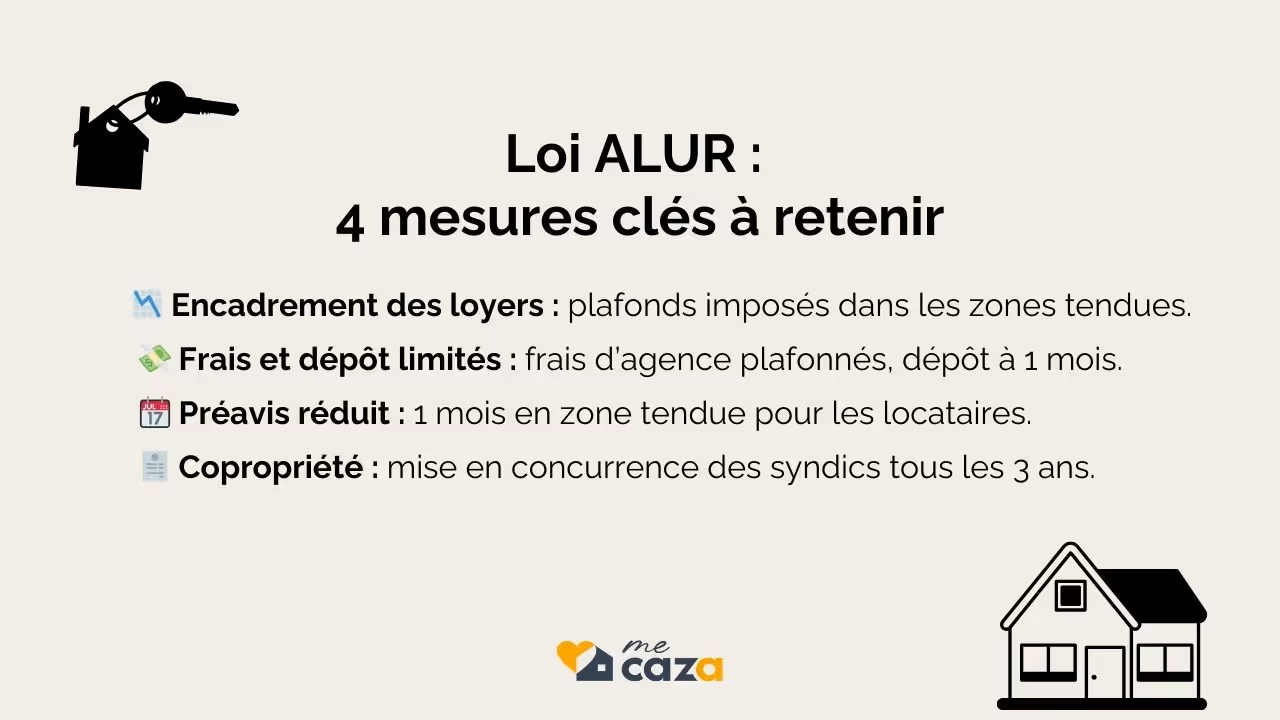ALUR 2025 Law: What Donors Absolutely Must
The ALUR law has profoundly transformed the French real estate market, by better protecting tenants and empowering owners. From rent controls to the winter break, this article explains everything you need to know about this essential law.
📅
30/4/2025

The ALUR Act (Law for Access to Housing and Renovated Urbanism) is a real turning point for the rental market and real estate in France. Promulgated in 2014, it aims to regulate rents, strengthen the transparency of condominiums, improve access to housing and modernize urban planning.
For a lessor, an investor or a real estate professional, this subject is crucial: obligations are evolving, sanctions are getting heavier, and the framework in which the owner operates is now more demanding. Ignoring these changes exposes you to financial or legal risks.
This article offers you:
- a complete overview of the ALUR law and its objectives,
- an analysis of its concrete implications for lessors (rents, notice, obligations),
- at the end of the article, practical strategies, a checklist and useful resources to secure yourself in your rental process.
1. The ALUR law: overview and objectives
In this first part, we provide a complete overview of the ALUR Law: from its origins, its objectives to its concrete impact in 2025. The objective is to give you a clear and structured vision of this system so that you know exactly where you are as a lessor or as an investor.
Origin and main axes of the law
The ALUR law, enacted on 24 March 2014, is part of a desire to improve access to housing, to strengthen the regulation of the rental market and to modernise urban planning.
Among the major axes:
- Rent control in tense areas, in order to limit excessive increases.
- Reform of the governance of condominiums, strengthening the transparency of charges and diagnoses.
- Improvement of urban planning and the energy efficiency of homes (DPE, fight against thermal sieves).
Where are we in 2025: experimentation, tense areas, impact for owners and tenants
In 2025, rent control remains tested in many municipalities and is gradually extending to overseas territories.
The scheme concerns leases signed in “tense” areas, where the number of vacant homes is limited and demand is strong. For owners, this means that they must check the area where their property is located and the applicable ceilings, under penalty of sanctions in case of non-compliance.
Key data: rate of compliance with rent regulations, increases in secondary areas, etc.
Some recent figures: according to an observatory, more than 20,000 ads were analyzed between August 2024 and August 2025 to measure compliance with rent ceilings.
The PAP site indicates that in a supervisory area, the rent must be between the “reduced reference rent” and the “increased reference rent”.
This shows that regulations are active, that lessors must adapt to them, and that good monitoring of this data is essential to secure a rental.
2. Impacts for the lessor: obligations, rents, notice
This second part focuses on the concrete consequences of the ALUR law for you, landlord or investor: what are your obligations, how is the rent regulated, what notice periods apply, and what new data you need to know in order to operate in full compliance.
Rent control according to municipality/tense area
For housing located in a municipality in a tense area, the landlord must ensure that the rent does not exceed the values set by the prefectural decree (lowered/increased reference rent) under penalty of sanctions.
In practice, this involves studying the local market and taking into account official values when setting or renewing rent.
Download the lessor's checklist.
Reduction of rental notice, deadlines, involvement for the lessor
The ALUR law has strengthened the rights of tenants, in particular by setting specific notice periods: for a furnished lease, the tenant can give leave under one month's notice under certain conditions (tense zone, transfer, etc.).
For the lessor, the leave must respect a period of six months in the case of an empty home and in the event of sale or takeover.
These provisions therefore change the management of the lease and impose a stricter schedule on the owner.
Other new obligations: diagnostics, tenant information, transparency
The ALUR law also requires greater transparency: displaying the IRL (reference rent index), providing diagnostics (DPE, lead, asbestos) and clear information for tenants.
For donors, this means:
- have all the documents up to date at the time of signing the lease,
- be in compliance with energy performance (since 2025, a classified G home can no longer be rented in a tense area).
These obligations, if they are not fulfilled, expose the risk of the lease being void or of penalties.

3. Taxation & specific charges
Beyond the legal obligations relating to renting or co-ownership, the ALUR law also has a strong impact on the taxation of lessors and the charges to be expected. For an owner-investor, mastering these aspects well makes it possible to secure profitability and to anticipate future costs.
Local taxes & surcharges
Owners of rented accommodation, subject to the ALUR law, must count on certain essential contributions. For example, in areas where the rental vacancy is high or the supply is scarce, increases in housing tax for second homes may apply, which reinforces the pressure on rental income.
In addition, rent control systems, which are part of the ALUR law, may limit the increase in rents during renewal or relocation. As the website of the Ministry of the Economy indicates: “The amount of rent excluding charges cannot exceed a certain ceiling”. (Source: Ministry of the Economy). It is therefore vital to integrate these limits and increases into your profitability plan.
Rental income and tax regimes
The nature of the lease (empty or furnished rental) will condition the taxation system:
- If the rental is furnished, it may fall under BIC or micro-BIC, with attractive discounts.
- For bare (empty) rentals, property income applies.
In addition, supervisory arrangements (rent ceiling, tense areas) can reduce your margins.
ANIL recalls that since Decree No. 2025-652 of July 15, 2025, the evolution of rents has been regulated in tense areas. (Source: ANIL)
Increased obligations & additional charges
The ALUR law has strengthened obligations in terms of diagnostics, transparency of agency fees and rental management. A guide highlights this: “The ALUR law reinforces the protection of tenants and imposes more responsibilities on lessors.”
In addition, in some condominiums, the obligation to build up a work fund or to produce a summary sheet is imposed. (Source: La Centrale Financement). These elements can generate additional costs that should be anticipated.
4. Set the right rent & choose the right tenant
The success of a rental depends as much on the fixed rent as on the quality of the tenant. Under the ALUR law, setting a “fair” rent while remaining in compliance, and attracting a reliable tenant, makes it possible to optimize profitability and reduce risks (vacancies, unpaid bills, disputes).
Analysis of the local market & fixing the rent
In tense areas, rent controls impose a ceiling. The PAP site indicates the terms and conditions: “The rent must be in a range between the reduced reference rent and the increased reference rent.”
You must: examine the rents in a similar neighborhood, check if your home is subject to supervision, take into account the quality of the property (furnished, renovated, energy performance) to adjust. An improperly set price can result in a prolonged vacation or a suboptimal rent.
Adapted tenant profile
A stable tenant (long term contract, permanent contract, family) is often a guarantee of peace of mind for the lessor. Under the ALUR law, notice periods have been reduced in some cases: this increases potential turnover.
It is therefore advisable to choose a profile that is committed for several years, with sufficient guarantees (deposit, unpaid rent insurance) to limit risks.
Guarantees & adapted lease contract
The lease must clearly mention all the conditions (duration, use, rent, charges, diagnoses). The lessor must verify the conformity and suitability of the lease for the property. The ALUR law requires good transparency of costs and commitments.
Solid guarantees (visible according to profile, insurance) reinforce your security.
5. Management, supervision & best practices
The signing of the lease is only the beginning of the rental relationship. Proactive management, respectful of obligations and attentive to the quality of the property, maximizes the duration of the lease, limits disputes and optimizes profitability.
Welcoming the tenant and clear communication
A good welcome, the delivery of a welcome booklet or a clear document on the rules (charges, use, contact in case of problems) create a healthy relationship. Communicating from the start therefore establishes a climate of trust, which can avoid incidents later.
Rent monitoring and proactive incident management
The lessor must regularly monitor the receipt of rent. Faced with a delay, a quick recovery is essential. The ALUR law has changed the framework for disputes and agency fees, so you have to be rigorous.
In addition, the periodic maintenance of the home minimizes damage and enhances the value of the property.
Optimizing the duration and profitability of the lease
To optimize the duration and profitability of a lease, it is essential to carry out a regular revaluation of the rent provided that it remains reasonable and consistent with the market. Any counterproductive effect that could lead to a prolonged rental vacancy should be avoided.
At the same time, maintaining housing in good condition, with up-to-date energy performance, has become imperative: as of January 1, 2025, housing classified G can no longer be rented.
This double strategy: the calibrated adjustment of the rent and the preservation of the property, favors the renewal of the lease rather than frequent renewal, which makes it possible to limit renovation costs, to reduce the vacancy and to establish a lasting rental relationship.
Before starting your project, check out this handy guide: Rent out your second home.
Conclusion
The ALUR law marks an essential milestone for lessors: it both imposes a stricter framework and offers an opportunity to professionalize your rental management. By integrating best practices: verification of the area and ceilings, compliant lease, rigorous management; you limit risks (unpaid, offenses, vacancies) and value your assets.
At Mecaza, we support you so that your property is rented in the best conditions, in full compliance. Take action: put your home at the service of an efficient, secure and profitable lease.
❓ FAQ
1. In which municipalities does the rent control apply?
The framework applies in municipalities classified as “tense areas”, where the supply of housing is much lower than the demand.
2. What are the consequences for a landlord if he exceeds the rent limit?
The lessor may be exposed to the partial nullity of the lease or to a reduction in rent; the announcement or the contract may be contested.
3. Has the rental notice changed for the tenant and for the landlord?
Yes: for some rentals in a tense area, the tenant benefits from a notice reduced to one month in certain cases (transfer, health reason, etc.).
4. What new obligations have been imposed on the lessor since the ALUR law?
The landlord must provide decent housing, maintain maintenance, provide access to diagnostics, provide proof of charges, and respect supervisory rules.
5. Does the furnished or unfurnished lease change the obligations related to the ALUR law?
Yes: although the general principles remain, the type of lease (furnished or empty) involves different durations, conditions and procedures.

Article written by Mélanie Jacquet,
Real estate expert from the Mecaza blog.
To go further

8/1/2026
Defining real estate specifications: the complete guide
Defining real estate specifications is an essential step in structuring a purchase, rental or investment project. Too often overlooked, this document nevertheless makes it possible to clarify your needs, to frame your budget and to avoid costly mistakes.
Lire l'article ⭢.avif)
24/7/2025
What does VEFA mean in real estate?
VEFA, VEFA... you have already seen this acronym. So what does buying on a plan really mean? Here's everything you need to know.
Lire l'article ⭢
25/4/2025
Hoguet law: definition and obligations of real estate agents
The real estate sector is governed by numerous laws designed to protect tenants and buyers. Among them, the Hoguet law plays a central role, discover what this law provides.
Lire l'article ⭢
